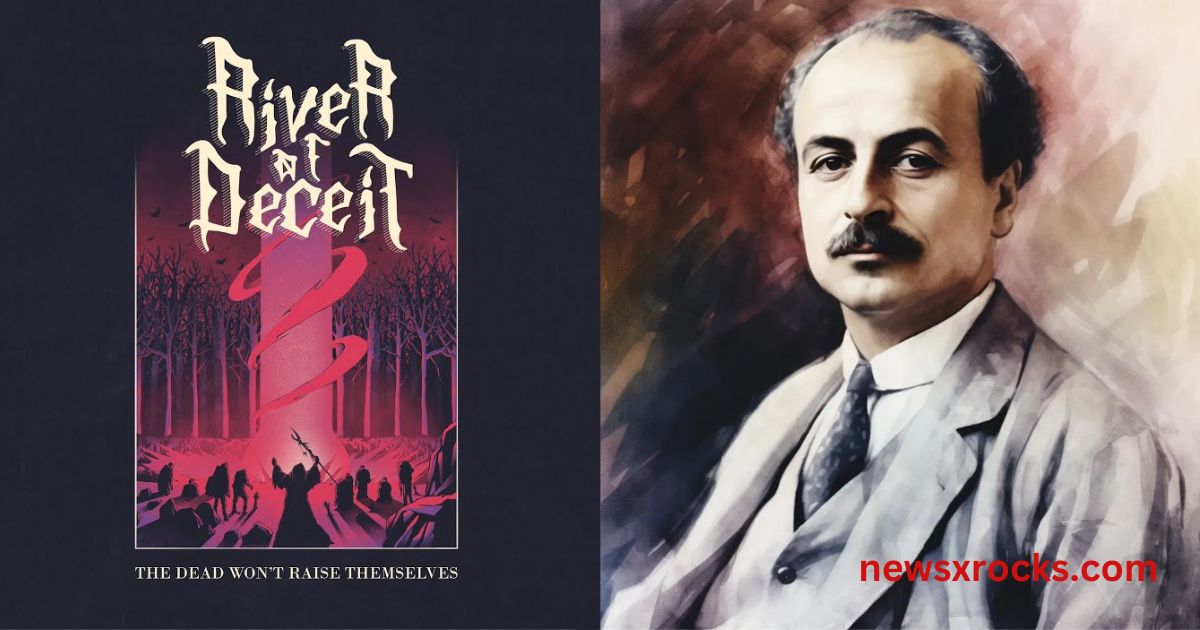“River of Deceit” is a song by the American rock band Mad Season, released in 1995. It is the band’s most popular track, blending elements of grunge, blues, and alternative rock. The song’s self-analyzing lyrics, written by lead singer Layne Staley, reflect his personal struggles with addiction and existential pain, offering a dark-colored yet powerful message.
Musically, the track is noted for its haunting melodies and slower tempo, setting it apart from the more aggressive sound associated with the grunge movement of the 1990s.
Who wrote River of Deceit

“River of Deceit” was written by the members of Mad Season, particularly by lead vocalist Layne Staley and guitarist Mike McCready. Layne Staley, known for his work with Alice in Chains, contributed the lyrics, while Mike McCready, from Pearl Jam, created the music. The song was part of Mad Season’s 1995 album Above. Staley’s lyrics were heavily influenced by his personal struggles with addiction and his reflections on spirituality.
Lyrics
[Verse 1]
My pain is self-chosen
At least, so the prophet says
I could either burn
Or cut off my pride and buy some time
A head full of lies is the weight, tied to my waist
[Chorus]
The river of deceit pulls down, oh oh
The only direction we flow is down
Post Chorus
Down, oh down
Down, oh down
Down, oh down
Down, oh down
[Verse 2]
My pain is self-chosen
At least I believe it to be
I could either drown
Or pull off my skin and swim to shore
Now I can grow a beautiful shell for all to see
[Chorus]
The River of Deceit pulls down, yeah
The only direction we flow is down
[Post Chorus]
Down, oh down
Down, oh down
Down, oh down
Down, oh down
The pain is self-chosen, yeah
Our pain is self-chosen
Down, oh down
Down, oh down
Down, oh down
Down, oh down
Key Themes in “River of Deceit”
- Self-Inflicted Pain
- The singer acknowledges that much of his suffering is self-chosen.
- There is an internal conflict between continuing down a destructive path or finding redemption.
- Choice Between Suffering and Growth
- The lyrics present a choice: either “burn” or “cut off pride” to find more time.
- This suggests the possibility of shedding pride or the past to allow for personal transformation.
- Deception and Illusion
- The “river of deceit” symbolizes being weighed down by lies, illusions, or self-deception.
- These falsehoods act as a burden, pulling the person down further into despair.
- Direction of Life
- The repeated phrase “the only direction we flow is down” implies a sense of inevitability in suffering.
- Despite the downward pull, there’s a feeling of personal responsibility in choosing how to react to life’s challenges.
- Metaphor of Drowning vs. Resurfacing
- The idea of drowning or swimming to shore represents the internal battle between surrendering to despair or fighting for survival and renewal.
- The “beautiful shell” symbolizes the potential to rebuild oneself after pain.
- Addiction and Personal Struggle
- The song can be interpreted as a reflection of Layne Staley’s personal battle with addiction.
- It touches on the painful journey of recognizing one’s destructive habits and the internal struggle to change.
What inspired the song?
The song “River of Deceit” by Mad Season was primarily inspired by lead singer Layne Staley’s personal struggles, especially his battle with addiction. Staley was deeply affected by his own experiences with substance abuse, which is reflected in the introspective and haunting lyrics. The song addresses themes of self-deception, suffering, and the difficult choices one faces when dealing with inner turmoil.
Related Post: Square Biz Meaning
The song was influenced by Kahlil Gibran’s book “The Prophet”, which Staley had been reading at the time. Gibran’s philosophical reflections on pain, self-awareness, and human suffering deeply resonated with Staley, and the line “My pain is self-chosen” is directly inspired by these teachings. The song blends these philosophical ideas with Staley’s personal life, creating a powerful meditation on the nature of suffering and self-destruction.
Frequently Asked Questions
What is “River of Deceit” about?
“River of Deceit” explores themes of self-inflicted pain, inner conflict, and the struggle between continuing down a destructive path or finding redemption.
What is the meaning of “River of Deceit”?
The “river of deceit” symbolizes the lies and self-deception that drag a person deeper into pain and despair.
What genre is “River of Deceit”?
“River of Deceit” falls within the alternative rock and grunge genres, but it also includes elements of blues.
Is “River of Deceit” about Layne Staley’s addiction?
Yes, the song reflects Layne Staley’s personal battle with addiction. The lyrics speak to the pain and self-destruction caused by addiction, as well as the possibility of finding redemption.
What is the significance of the line “cut off my pride and buy some time”?
It highlights choosing to let go of ego to create a chance for personal growth and redemption.
Who are the other members of Mad Season and what role did they play in the song?
Mad Season’s lineup included Mike McCready (guitar), John Baker Saunders (bass), and Barrett Martin (drums), with each contributing to the song’s sound and arrangement.
What album is “River of Deceit” from?
“River of Deceit” is from Mad Season’s only studio album, Above, which was released in 1995. The album is widely regarded as a standout in the grunge and alternative rock scenes of the ’90s.
Conclusion
“River of Deceit” is a deeply reflective and emotionally charged song that captures the essence of inner turmoil and self-destruction. Written by “Layne Staley” during a period of personal struggle, the song delves into themes of self-inflicted pain, addiction, and existential suffering. Inspired by both Staley’s own experiences and Kahlil Gibran’s The Prophet, the song serves as a poignant meditation on the choices that lead to pain and the possibility of redemption.
Musically, it blends grunge, alternative rock, and blues to create a haunting and contemplative atmosphere, making it one of Mad Season’s most iconic tracks. The song remains a powerful testament to the battle between despair and hope, resonating with listeners for its honesty and emotional depth.
